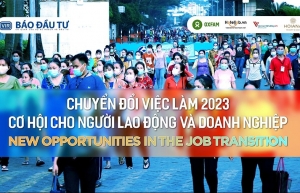Expanding skills vital to taking on AI wave
The fear of job losses or jobs being replaced by modern tech is spreading rapidly worldwide after the recent explosion in interest and research in AI technology.
 |
| Expanding skills vital to taking on AI wave |
According to Nguyen Thu Giang, associate director of Navigos Group Vietnam, the emergence of technology could cause many employees to be replaced, including IT personnel, if they do not change their mindset and self-improve their qualifications and skills to adapt in a timely manner.
“Vietnam has about 50,000 IT graduates each year, but only 16,000 people meet the requirements of employers. The lack of critical thinking, teamwork, and foreign language skills has made the performance of Vietnamese workers lower than South Korea, Singapore, and other neighbouring countries,” Giang said at a seminar on the future of jobs in the digital economy hosted by the National Innovation Centre last week in Hanoi.
According to a forecast from the International Labour Organization, by 2030, Vietnam will face labour replacement when up to 70 per cent of jobs are at high risk due to the application of digital technology. Jobs with a high rate of being replaced by machines and robots are concentrated in retail, textiles, agriculture, and fisheries with a probability of more than 80 per cent, while workers in the processing, manufacturing, and electronics also have a 75 per cent chance of being replaced.
The study results of the 2023 Work Trend Index published by Microsoft in mid-May also show that just over half of Vietnamese workers are worried that AI will replace their job position. Despite the increasing pressure and influence on the job market, nine out of 10 workers are willing to use AI to reduce their workload.
According to the report, more than 90 per cent of Vietnamese feel comfortable using AI for administrative, analytical, and creative tasks, nearly 20 per cent higher than the global average.
Hung Tran, founder and president of Got It Education, a technology startup that has raised $25 million in Silicon Valley, admitted that technology could replace people in some jobs, but this may only happen to low-skilled and unwilling-to-learn workers.
“If people work hard to update new skills, they can compete with technology and use it as a tool to improve work performance,” Hung said. “Technology will help businesses free their employees from the burden of massive digital data and foster innovation. For repetitive tasks such as customer service or electronic painting, technology will do better by providing content that meets the needs and interests of users.”
According to Duong Le Minh Duc, deputy director of the AI Business Centre of FPT Smart Cloud, AI should be considered as a tool to support employees instead of competing with workers for jobs.
“The orientation of FPT when deploying AI is the story of humans and machines working together, not trying to completely replace humans. It will play the role of a supporting tool, handling simple content, while the rest of the enterprise’s human resources can focus on more complex issues,” Duc said.
AI technology is predicted to create a market of $15.7 trillion by 2030 and become the driving force behind the economic development of many countries, the World Economic Forum said in May. It predicted that by 2025, AI will cause 85 million people to lose their jobs around the world, but also create 97 million new jobs.
Along with the development of the technology wave, AI is increasingly affecting the labour market in many countries and changing the structure of employment.
In Hong Kong, one-quarter of the workforce, or about 800,000 people, will be unemployed or have to change jobs in the next five years due to AI taking over, according to the Hong Kong Salary Guide 2023 report published in March by IT recruiter Venturenix.
Data entry, administration, and customer care staff will be the jobs that could be eliminated in the coming years. Some high-paying professions such as lawyers, translators, content creators, and illustrators are also in a state of alarm.
In China, Boston Consulting Group estimated that 2.3 million financial industry employees, equivalent to 23 per cent of employees in the banking, insurance, and securities industries, will lose their jobs or have to move to other positions in a few years.
Meanwhile, Forrester Research forecasted that about 33,000 advertising jobs in the United States, or about 7.5 per cent of the industry’s workforce, will be automated by 2030. The report estimates around 5.9 million new jobs in the US could be created by 2027 thanks to opportunities created by technologies, but at the same time, 23.5 million jobs are estimated to be eliminated due to AI.
| Phan Vinh Quang - Head, Research Team Usaid Wise
In Vietnam, two types of economy exist at the same time, the new and the traditional. In the traditional one, a lot of people are becoming unemployed, while in the new economy, the demand on the labour force is increasing, and numerous companies are recruiting continuously. On the digital workforce platform developed by USAID and the National Innovation Centre, we provide an overview and suggest salary for jobs in the digital economy. Young people who are looking for a job will have some useful and proper information on the demand of the market, requirements of employers, and salary for employees with these skills in some industries. Vietnamese employees are intelligent and good at logical thinking, but not often great at soft skills, working in groups, or innovating. If we change the methods of education and training, the local workforce will absolutely match with the development of the digital economy. The digital economy is opening up plenty of opportunities along with some challenges. For instance, technologies and jobs are changing day by day. Unless quickly adapting and expanding their knowledge, employees will not be able to catch up with the trends. Studying and learning lasts forever. | |
| Do Tien Thinh - Deputy director National Innovation Centre
At present, we can see and feel the digital economy in every activity of the economy. For example, the Phu Thuong sticky rice is quite well-known, making up 80 per cent of the market share in Hanoi. This seems unrelated to digitalisation, but in fact, it has happened because sometimes the salesman or customers upload pictures or information related to the product on social media. In a wider view, technologies are supporting us a lot in all daily life and work to make everything quick and easy. To improve labour quality, our launch of a digital workforce platform provides the most important general knowledge about the job market, thereby orienting career development trends for young people. Employers will also be able to adjust their plans and use labour resources more effectively and appropriately in response to fluctuations in the labour market. | |
| Nguyen Ngoc Tuan - Director, Bkacad
Technologies are changing three things: the way we play, learn, and work. Therefore, local employees should research and learn as much as they can, in addition to basic skills and knowledge. For example, students nowadays often use AI bots to collect information for their homework. Technology does everything more easily, but gives us a headache because we cannot know the value or accuracy of this tech yet. While technology companies scale down their operations, this could be a good chance for digital workforces to look for new jobs. However, they should enhance their skills and knowledge to become flexible and adapt to various jobs in the IT industry in particular, as well as other fields. |
 | The impressive changes in Vietnamese labour market The official passage of the Law on Foreign Investment in Vietnam in 1987 is considered a historic turning point that contributes to attracting an increasing number of foreign-led enterprises into Vietnam over the years. Multinational corporations opening new branches as well as newly established foreign-backed enterprises in many fields create great demand for domestic labour, generating jobs and improving livelihoods and quality of life for Vietnamese people. |
 | Transitional support the key to protect the labour force The bleak job market and the growing number of job losses in the first half of this year has posed a challenge in supporting workers to transition into sustainable employment. |
What the stars mean:
★ Poor ★ ★ Promising ★★★ Good ★★★★ Very good ★★★★★ Exceptional
Themes: Human Capital 4.0
Related Contents
Latest News
More News
- Tet event in Japan celebrates success of 14th National Party Congress (January 25, 2026 | 10:04)
- 14th National Party Congress wraps up with success (January 25, 2026 | 09:49)
- Congratulations from VFF Central Committee's int’l partners to 14th National Party Congress (January 25, 2026 | 09:46)
- List of newly-elected members of 14th Political Bureau announced (January 23, 2026 | 16:27)
- 14th Party Central Committee unanimously elects To Lam as General Secretary (January 23, 2026 | 16:22)
- List of members of 14th Party Central Committee announced (January 23, 2026 | 09:12)
- Highlights of fourth working day of 14th National Party Congress (January 23, 2026 | 09:06)
- Press provides timely, accurate coverage of 14th National Party Congress (January 22, 2026 | 09:49)
- Press release on second working day of 14th National Party Congress (January 22, 2026 | 09:19)
- Minister sets out key directions to promote intrinsic strength of Vietnamese culture (January 22, 2026 | 09:16)




 Tag:
Tag:




















 Mobile Version
Mobile Version